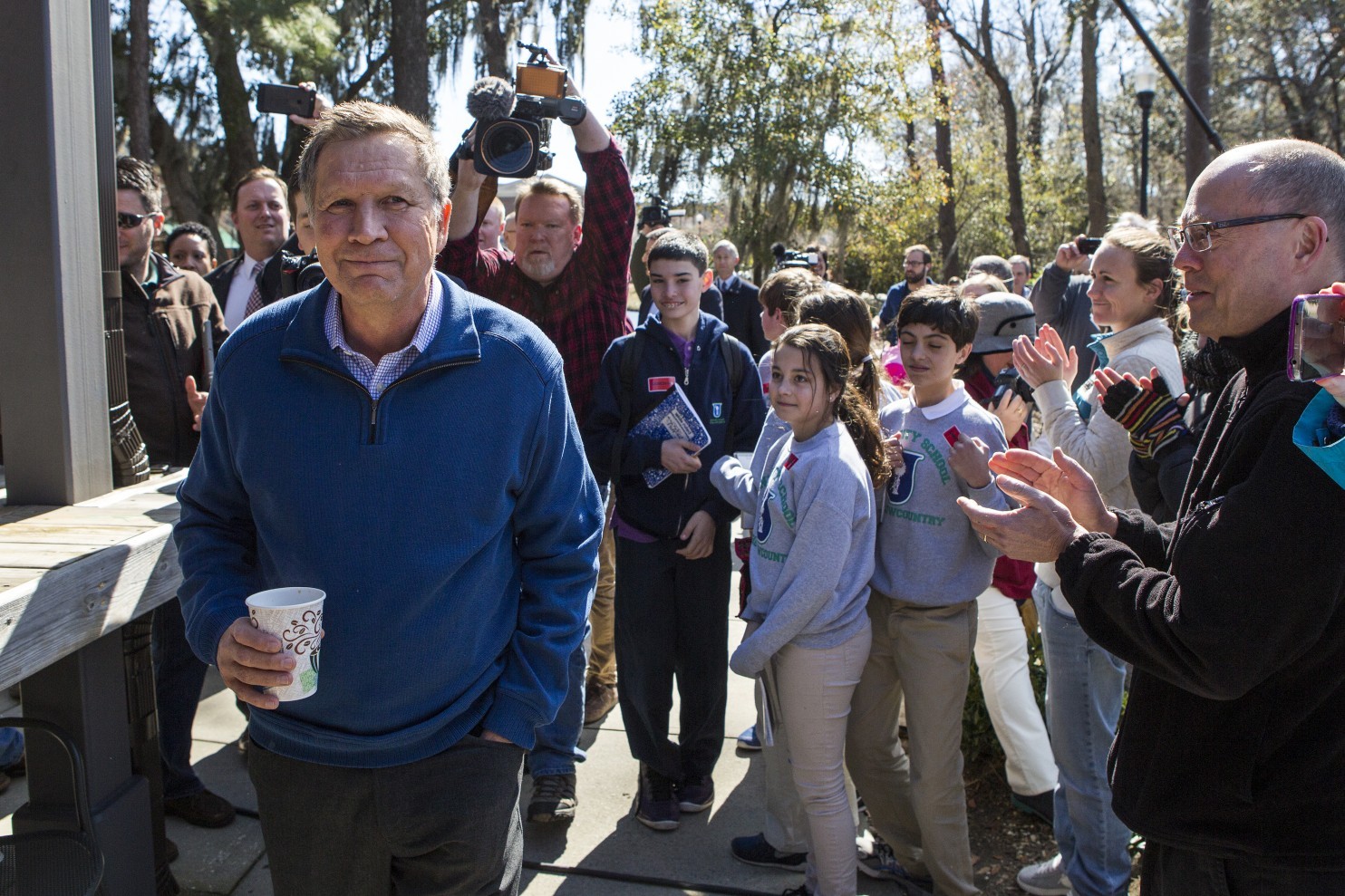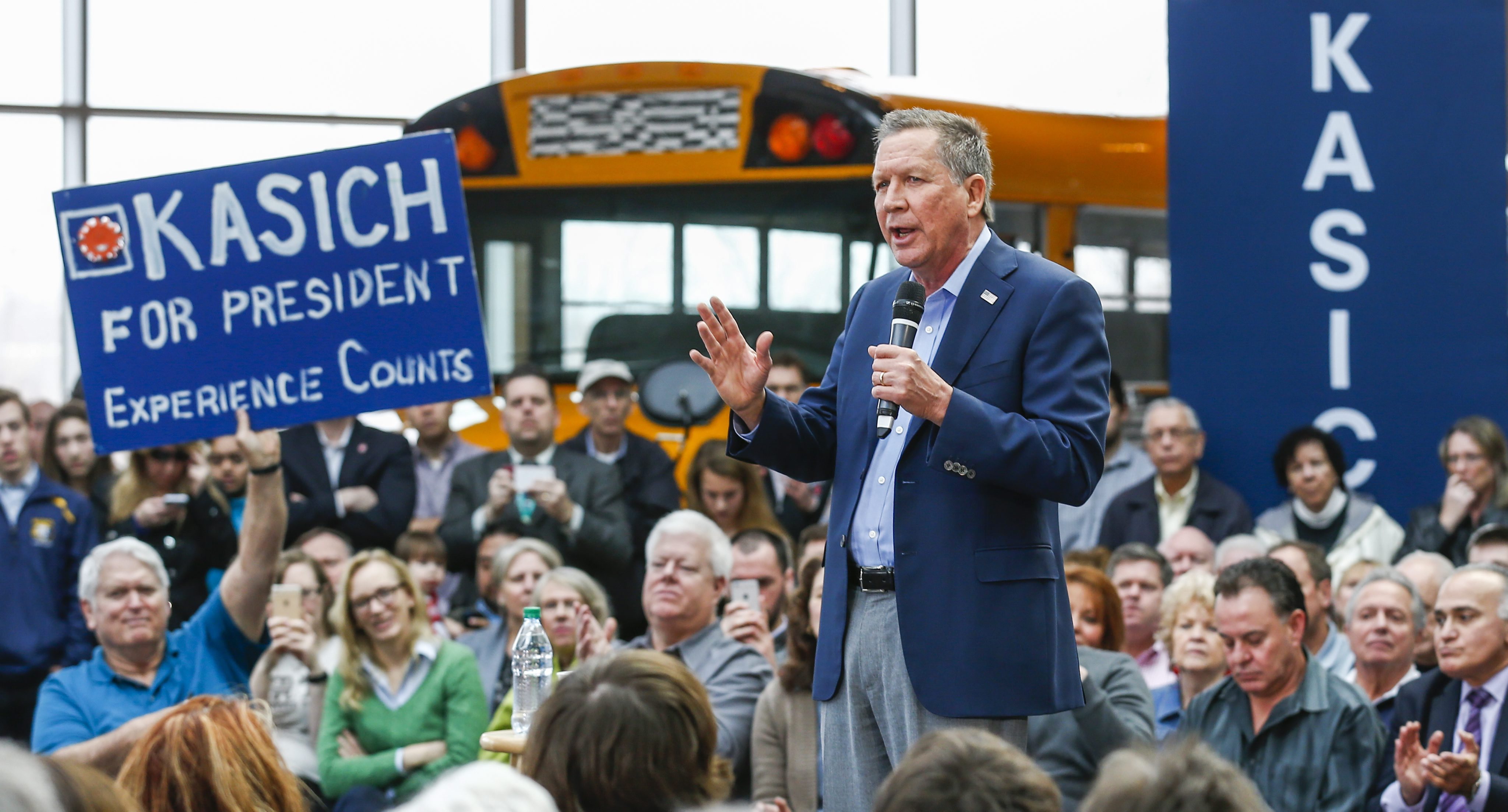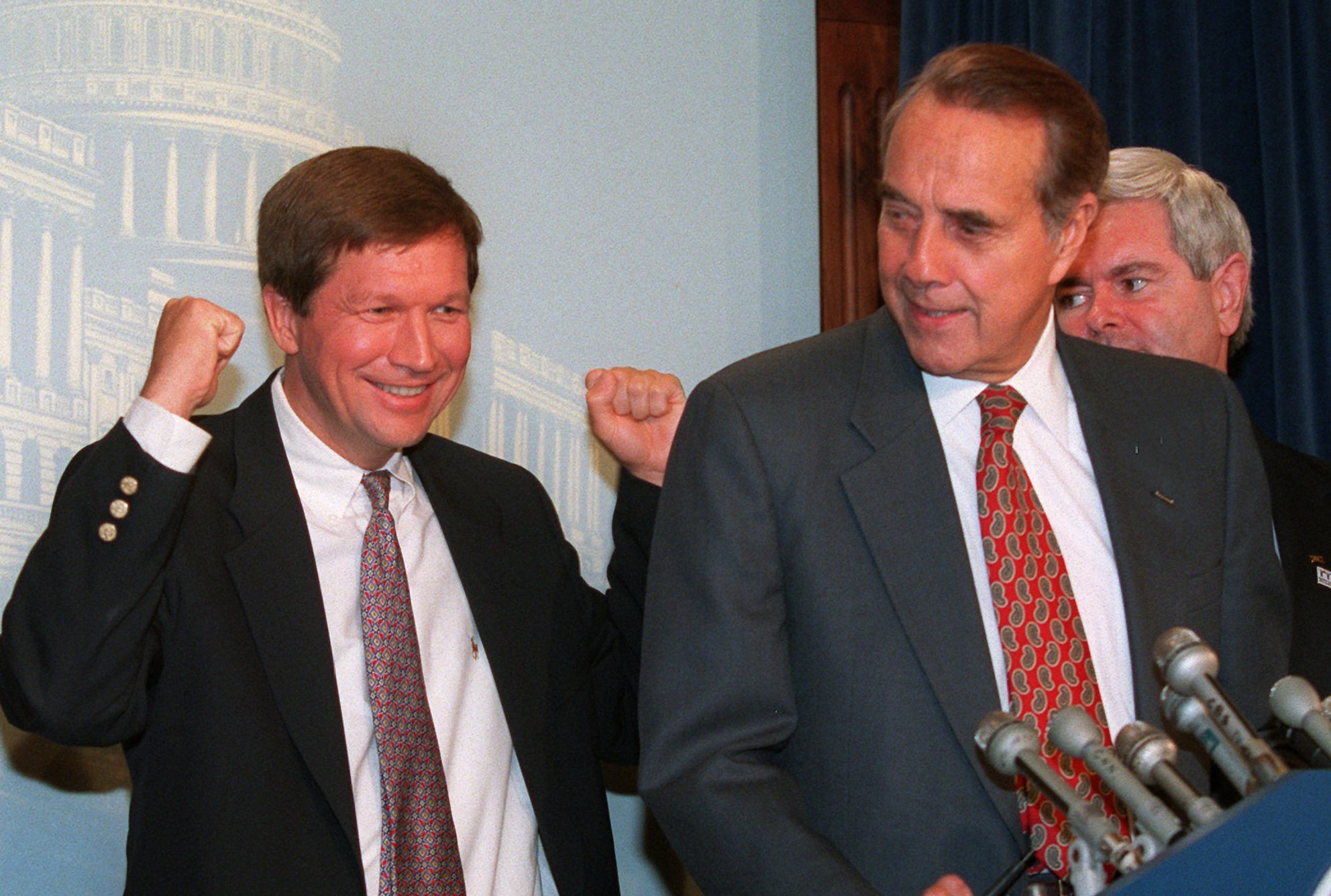
They are the “Coalition of the Formers” — a band of ex-governors, ex-senators and ex-congressmen who were shining stars of the Republican Party in the 1990s and 2000s and who are now uniting around the long-shot presidential candidacy of John Kasich.
These fixtures of an earlier GOP establishment have rejected the celebrated candidate of today’s younger Beltway insiders, Sen. Marco Rubio of Florida, in favor of the Ohio governor and former House Budget Committee leader who they say embodies the dealmaking bonhomie that has vanished in Washington.
For months, day after day, the Kasich campaign has trumpeted new endorsements — and the endorsers tend to have one thing in common: a “former” in their titles.
“Maybe I’m dating myself, but everybody I know is with Kasich,” said Bill Weld, the governor of Massachusetts from 1991 to 1997.
The Republican establishment is largely united in its desire to stop insurgent front-runner Donald Trump, but it remains divided on who would be the best candidate to do so. As Rubio, 44, recruited rising stars and generational peers such as South Carolina Gov. Nikki Haley and Sen. Cory Gardner (Colo.) to his campaign, Kasich has attracted more sage figures turned off by today’s polarized politics and no-time-to-wait politicians.

Longtime GOP strategist Steven Schmidt characterized the establishment as split between “This is the person qualified and prepared to be president” vs. the “Money Ball” view of a winning candidate — someone with “a computer-generated model of demographics and charisma.”
So far in the presidential race, Republican voters have shown a preference for Rubio — he would be the model of demographics and charisma — over Kasich. With a few exceptions, Rubio has outperformed Kasich and enjoys a delegate lead, although both are far behind Trump.
There is a possibility, however, that Kasich outlasts Rubio. Both men face must-win contests Tuesday in their home states, and recent polls indicated Kasich in a better position to prevail in Ohio than Rubio is in Florida. Rubio also took the unusual step on Friday of encouraging his Ohio supporters to cast their votes for Kasich in that state’s primary, reasoning it increases the odds of stopping Trump.
A quintessential Kasich booster is Tom Ridge, whose public service résumé is one of traditional dues-paying: assistant district attorney, congressman, Pennsylvania governor, homeland security secretary. He initially backed Jeb Bush but quickly switched his allegiance to Kasich after the former Florida governor quit the race.
“I prefer performance to promise,” Ridge said. “I think Rubio has a lot of promise. . . . I have enormous respect for this young man and for the institution of the Senate. But there is no alternative to being personally and politically accountable for outcomes.”
Like Ridge, some of Kasich’s supporters served with him in the House in the 1990s. But they insist their endorsements are based on more than friendship. They see the Congress in Kasich’s era — when, for instance, Kasich was an architect of bipartisan budget accords with President Bill Clinton — as profoundly different than the largely obstructionist Congress under President Obama, even considering the many politically motivated Clinton scandals and probes.
“We remember the ’90s as a period when government actually worked,” said Peter Hoekstra, a former Michigan congressman who is backing Kasich. “We balanced the budget, we reformed welfare, we cut taxes — all on a conservative agenda, but we did it with Republicans and Democrats coming together. America prospered.”
Hoekstra credits Kasich with those breakthroughs. “John actually has a record of accomplishment, okay?” he said. “We don’t know whether Marco Rubio has the capability to pull off that kind of leadership.”
Idaho Gov. C.L. “Butch” Otter, another former House member, said of Kasich: “I heard in reverent tones how people would speak about him. . . . You would hear people say, ‘Kasich worked this out,’ ‘Kasich did this and did that.’ ”
Thinking about Kasich’s backers, Benjamin L. Ginsberg, a GOP elections lawyer and Washington fixture, said they are “people who remember an era of civility. There’s not a tea party guy on that list.”
“Rubio came up as a tea party darling,” Ginsberg added. Of Kasich’s backers, he said, “They’re all guys who were used to making deals.”
Charles R. Black Jr., a D.C. lobbyist and Republican strategist, said a leading indicator of this sentiment came last summer, shortly after Kasich entered the race, when he got a call from a former Republican Senate leader.
“I’m friends with everyone,” Black said. “Trent Lott called and said, ‘I’m going with Kasich.’ He gets things done. He’s willing to do the hard work. He muscles people to get things done.”
Lott, who represented Mississippi on Capitol Hill for 34 years, said that although he finds Rubio “very attractive” as a candidate, he decided to back Kasich because “you better have a man or a woman that knows what the hell is going on in Washington.”
“Marco Rubio has quite a life story, and he is the most articulate of the bunch, and he’s got a vision,” Lott said. “He really can impress you with that. I can see why Nikki Haley and some of the newer generation of leaders would be for Marco. I think, though, that John’s greater experience and longevity trumps that.”
Rubio’s candidacy is built on the premise that Republicans want a new generation of leaders. As he said in a South Carolina speech last month, “The children of the Reagan revolution are ready to assume the mantle of leadership.”
Rubio has carved out prominent roles in his campaign for fellow generational revolutionaries who burst onto the scene with the 2010 tea party wave: Haley, 44; Gardner, 41; Sen. Tim Scott (S.C.), 50; and Rep. Jason Chaffetz (Utah), 48.
“There is a new generation of leaders in the Republican Party,” Gardner said. “A new Republican brand is emerging that is about an optimistic vision for this country — that is somebody who’s standing in front of the people and smiling instead of scowling.”
Kasich’s supporters almost uniformly say they admire Rubio but do not think he has yet put in the years or gained the governing experience to be president.
“Rubio is the young, bright, Hispanic, passionate voice of the future, but he’s not ready to be president,” said Christine Todd Whitman, a former New Jersey governor and Environmental Protection Agency administrator. “We’ve just had seven years of on-the-job training, and I don’t think it’s been a great success.”
For Whitman and other old-guard figures backing Kasich, the pipe dream is a Kasich-Rubio ticket.
“That would be the Democrats’ worst nightmare,” Weld said. “It would give you all Kasich’s experience, Rubio’s youth, and they both have tremendous energy. That’s my end game.”- Publish my comments...
- 0 Comments
